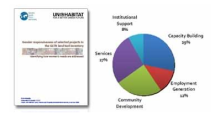Land Library
Welcome to the Land Portal Library. Explore our vast collection of open-access resources (over 74,000) including reports, journal articles, research papers, peer-reviewed publications, legal documents, videos and much more.
/ library resources
Showing items 1 through 9 of 84.[via UN-HABITAT] GLTN considers gender as a critical cross-cutting theme in the work on promoting pro-poor, large-scale land tools (for more information on GLTN see www.gltn.net).
This report outlines how climate change is expected to have serious environmental, economic, and social impacts in South Africa. It states that rural farmers, whose livelihoods depend on the use of natural resources, are likely to bear the brunt of adverse impacts.
ABSTRACTED FROM THE OPENING PARAGRAPHS, AND THE BOOK BLURB: The decentralization of control over the vast forests of the world is moving at a rapid pace, with both positive and negative ramifications for people and forests themselves.
This study discusses the innovation adoption of leading farmers and their problems and suggestions. A focus group discussion was conducted on leading farmers of the Tram Kak District, Takeo Province, Thailand, who first adopted the system of rice intensification (SRI).
In Vietnam, forest devolution policies were implemented in the early 1990’s under which the government transferred management power over large areas of forested land previously controlled by the state forest enterprises or local authorities to local households.
Hanfets is a popular mixture of wheat and barley grown in the highlands of Eritrea and Tigray (Northern Ethiopia).
Land use/cover change (LUCC) is often the cumulative result of individual farmer's decisions. To understand and simulate LUCC as the result of local decisions, multi-agent systems models (MAS) have become a popular technique.
Land-use and cover changes around Budongo Forest Reserve (BFR) were analysed from multi-temporal LandSat images (1988 and 2002) and associated field-based studies in 2003-2004.
A major development concern of the 1970s and 1980s was 'the other energy' or 'woodfuel crisis'.




